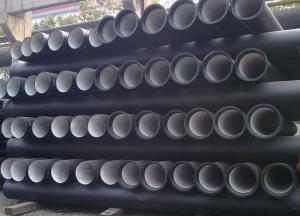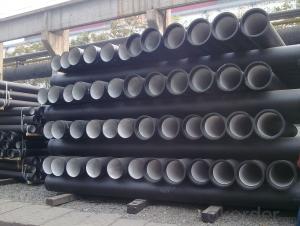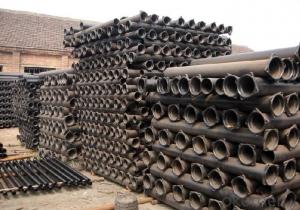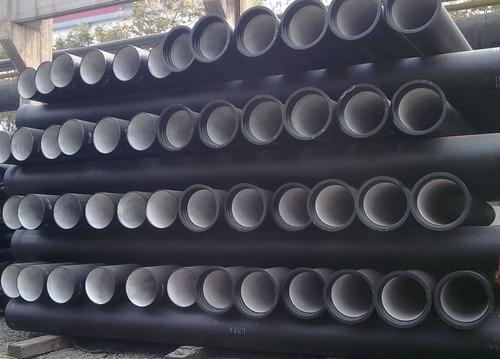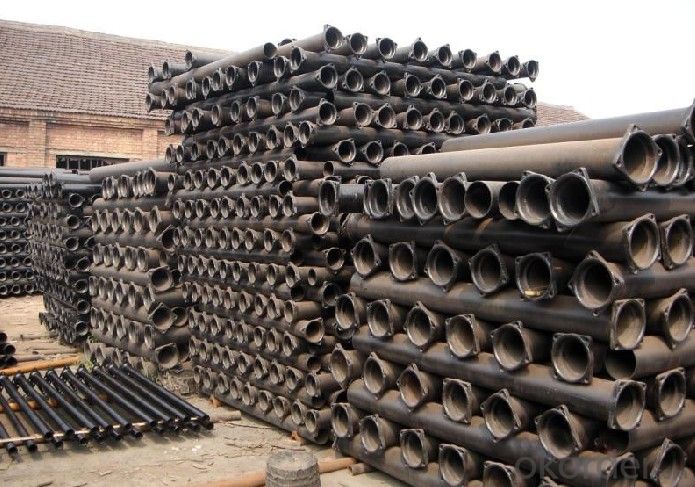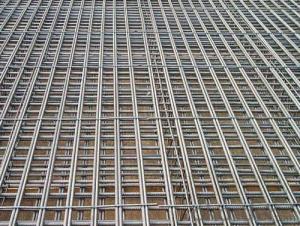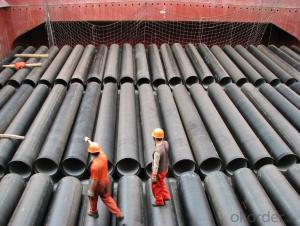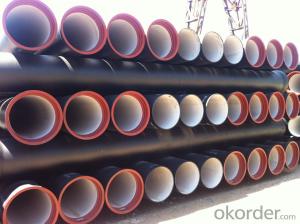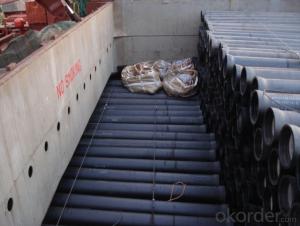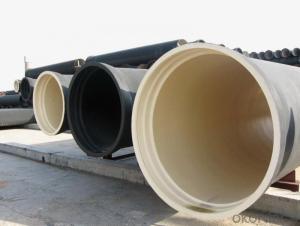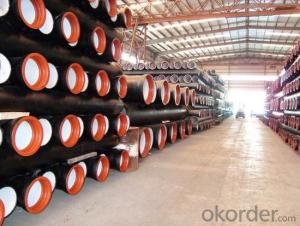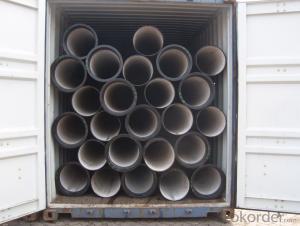Round Ductile Iron Pipe Supplier EN598 DN400 K9
- Loading Port:
- China main port
- Payment Terms:
- TT or LC
- Min Order Qty:
- 20 m.t.
- Supply Capability:
- 200000 m.t./month
OKorder Service Pledge
OKorder Financial Service
You Might Also Like
1. Ductile Iron Pipe Description :
We have passed ISO9001,ISO14001,OHSMS18001 certificate.
2. Main Features of the Ductile Iron Pipe:
1).Quality guarantee
• Chemical checking
• NDE after rough machining
• Mechanical testing after heat treatment
• Final NDE,dimension inspected
2).Quality document
• Full Q.A document as per client request
3).Packing and Shipping
• standard export package(carton/wooden case/pallet)
• accept FOB,FAS,CNF,CIF door to door etc or customer designated shipping agent
4).Service
• Drawing: we can translate your original drawing, offer best suggestion on design
• Quality: we have full set quality control system to guarantee the best quality.
• Inspection: inspect in house, all our products must be checked 3 times before packing
5)Inspection
• In-house Foundry
• Third party inspection available upon requirement
6) Our goal
• To be your preferred partner
3. Ductile Iron Pipe Images:
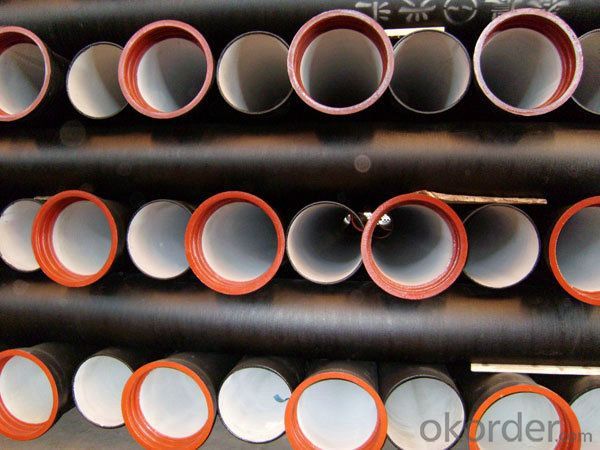
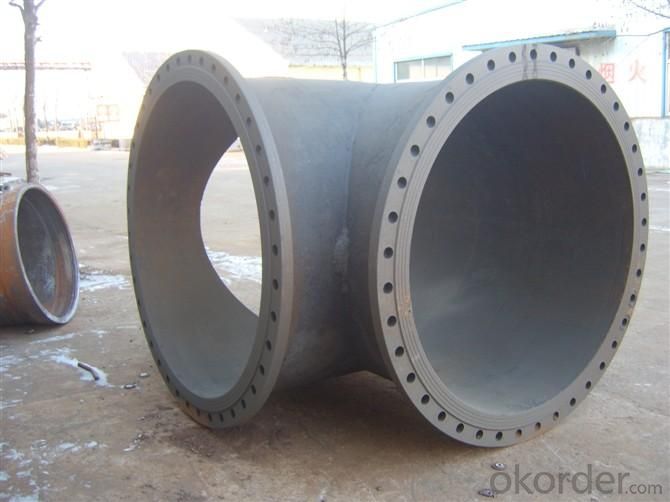
4. Ductile Iron Pipe Specification:
Quick Details
Place of Origin: China (Mainland)
Model Number: DN80-1600
Length: 6M/5.7M/NEGOTIATED
Standard: ISO2531 / EN545
Application: Potable/Sewage Water
Diameter: DN80-1600
Shape: Round
Hardness: 230
Pipe Wall Thickness: standerd
Pull Strength: 420
Yield (≥ MPa): 300
Material: Ductile Iron
water ductile iron pipe: SO2531 / EN545 DI pipe
5. FAQ:
1.Q: Why would you choose ductile iron pipe rather than other pipe materials?
A:The reasons are obvious for that not only ductile iron pipe possesses the inherent strength and flexibility of ductile iron, combined with proven corrosion protection systems, but also the cost savings can be achieved from design to installation and commissioning.
2.Q:Why can you guarantee the inner of pipes can’t be corroded?
A: High alumina cement mortar lining and sulphate-resistant cement mortar lining. These two special linings are applicable to inner anti-corrosion for sewage pipes, improving resistance to erosion of the sewage components.
- Q: Can ductile iron pipes be used in areas with high levels of organic matter in soil?
- Yes, ductile iron pipes can be used in areas with high levels of organic matter in soil. Ductile iron pipes are known for their durability and strength, making them suitable for various soil conditions, including those with high levels of organic matter. The pipes are resistant to corrosion and can withstand the chemical reactions that occur in organic-rich soils. Additionally, ductile iron pipes have a smooth interior surface, which reduces the likelihood of organic matter buildup and clogging. However, it is important to consider the specific conditions of the soil and consult with engineers or experts to ensure proper installation and maintenance practices are followed.
- Q: Can ductile iron pipes be used for underground slurry pipelines?
- Yes, ductile iron pipes can be used for underground slurry pipelines. Ductile iron pipes are known for their strength, durability, and resistance to corrosion, making them suitable for a variety of applications including underground slurry pipelines. They provide a reliable and cost-effective solution for transporting slurry, which is a mixture of solids and liquids, over long distances. The inherent toughness and flexibility of ductile iron pipes allow them to withstand the abrasive nature of slurry and the external loads associated with underground installation. Additionally, ductile iron pipes can be easily joined using various methods, ensuring a secure and leak-free pipeline system. However, it is important to consider the specific properties of the slurry being transported and consult with experts to determine the appropriate pipe specifications and design considerations for the underground slurry pipeline.
- Q: Are ductile iron pipes suitable for railway crossings?
- Yes, ductile iron pipes can be suitable for railway crossings. Ductile iron is a strong and durable material that has been widely used in various applications, including water and sewage systems. Its high tensile strength and flexibility make it suitable for withstanding heavy loads and vibrations, which are common near railway crossings. Furthermore, ductile iron pipes have excellent resistance to corrosion, which is crucial in areas prone to moisture and exposure to different weather conditions. This resistance ensures the longevity of the pipes, reducing maintenance and replacement costs. Additionally, ductile iron pipes are known for their ease of installation and versatility. They can be easily connected with other types of pipes or fittings, allowing for a seamless integration into the overall railway crossing infrastructure. It is important to note that the suitability of ductile iron pipes for railway crossings also depends on various factors such as load requirements, soil conditions, and specific project specifications. Consulting with engineering professionals and adhering to industry standards and regulations is essential to ensure the appropriate selection and installation of ductile iron pipes for railway crossings.
- Q: How are ductile iron pipes made?
- Ductile iron pipes are made through a process called centrifugal casting. In this method, molten iron is poured into a rapidly spinning mold, which forces the iron to evenly distribute along the walls of the mold. As the mold continues to spin, the iron cools and solidifies, forming a hollow cylindrical shape. This process allows the iron to retain its strength and flexibility, making it suitable for use in various piping applications.
- Q: Are ductile iron pipes resistant to abrasion or wear?
- Yes, ductile iron pipes are highly resistant to abrasion or wear. Ductile iron, also known as cast iron, is a strong and durable material that is specifically designed to withstand abrasive conditions. The unique microstructure of ductile iron provides excellent resistance to abrasion, making it an ideal choice for applications where pipelines are exposed to high levels of wear. Additionally, ductile iron pipes are known for their long service life, which further demonstrates their ability to withstand abrasion and wear over time.
- Q: Are ductile iron pipes suitable for wastewater treatment plants?
- Yes, ductile iron pipes are suitable for wastewater treatment plants. Ductile iron pipes are known for their durability, strength, and resistance to corrosion, making them ideal for handling the harsh and corrosive environment found in wastewater treatment plants. Additionally, they have a smooth internal surface, reducing the risk of clogging and facilitating the efficient flow of wastewater.
- Q: How does ductile iron pipe handle ground movement and settlement?
- Ductile iron pipe is highly resilient and can effectively handle ground movement and settlement. Its flexibility and strength allow it to withstand external loads and pressure variations caused by ground shifts and settlement. The pipe's inherent ability to absorb and distribute stress ensures its stability, minimizing the risk of damage or failure due to ground movement. Additionally, ductile iron pipes are commonly installed with flexible joints that further accommodate ground shifts, providing a reliable and durable solution for underground applications.
- Q: What are the different accessories available for ductile iron pipe?
- There are several accessories available for ductile iron pipes that help enhance their functionality and ensure efficient operation. Some of the common accessories include: 1. Flange Adapters: These accessories help connect ductile iron pipes to other pipe materials or equipment such as valves, pumps, or fittings. Flange adapters provide a secure and leak-proof connection. 2. Mechanical Joint Fittings: Mechanical joint fittings are used to join ductile iron pipes together. They consist of a gland, gland follower, and bolts, providing a flexible and easily adjustable connection. 3. Restrained Joint Fittings: These fittings are used in applications where the pipe needs to be restrained to prevent movement or separation. They ensure stability and prevent potential damage from external forces or pressure. 4. Thrust Blocks: Thrust blocks are concrete structures used to resist the thrust generated by internal pressure in ductile iron pipes. They prevent pipe movement and maintain stability. 5. Valve Boxes: Valve boxes provide protection and easy access to valves installed along the ductile iron pipeline. They are typically made of cast iron or polymer materials and are available in various sizes and designs. 6. Hydrant Assemblies: Hydrant assemblies are installed for fire protection purposes. They consist of a ductile iron pipe, a hydrant valve, and a fire hydrant. These assemblies are crucial for quick access to water during firefighting operations. 7. Tapping Saddles: Tapping saddles are used to create a branch connection on a ductile iron pipe without interrupting the flow. They provide a convenient way to install service connections, valves, or meters. 8. Pipe Restraints and Supports: These accessories are used to secure ductile iron pipes to structures or prevent excessive movement. They help maintain proper alignment, prevent sagging, and ensure the structural integrity of the pipeline. 9. Pipe Repair Clamps: In case of pipe damage or leaks, repair clamps provide a quick and temporary solution. These clamps are designed to fit around the damaged area and provide a tight seal to stop the leak. 10. Gaskets and Seals: Gaskets and seals are essential accessories to ensure leak-free connections. They are available in various materials, such as rubber or synthetic compounds, and are used to create a watertight seal between pipes or fittings. These are just a few examples of the accessories available for ductile iron pipes. The selection of accessories depends on the specific requirements of the project, and consulting with a pipe supplier or engineer is recommended to ensure the right accessories are chosen for the application.
- Q: Ductile iron pipe joint leakage
- The main reason for the leakage is that the installation is not in place, resulting in the loss of the apron. Sealed with cement or pipe head Hough section. Recommend the use of Hough section fast and convenient, and there is no menace from the rear.
- Q: Will the quality of ductile iron shrink?
- This is a ductile iron is prone to problems, manhole covers, large flat pieces, you have to see clearly, and some appear to be concave, not shrink, it may be caused by large gas emissions, not out
Send your message to us
Round Ductile Iron Pipe Supplier EN598 DN400 K9
- Loading Port:
- China main port
- Payment Terms:
- TT or LC
- Min Order Qty:
- 20 m.t.
- Supply Capability:
- 200000 m.t./month
OKorder Service Pledge
OKorder Financial Service
Similar products
Hot products
Hot Searches
Related keywords
